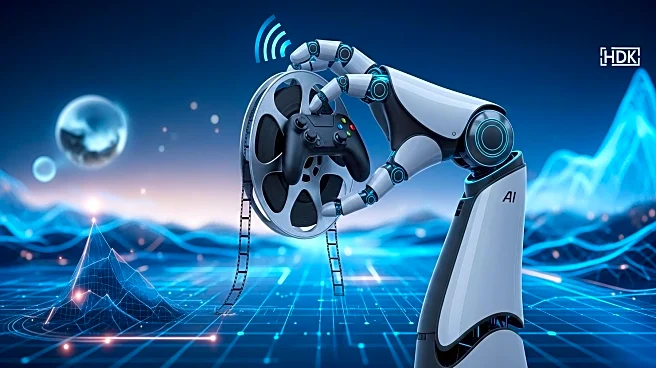What's Happening?
Elon Musk has announced ambitious plans for his xAI studio to release an AI-generated video game and a movie by the end of 2026. Musk's xAI studio aims to leverage AI technology to create a 'great' video game and a 'watchable' movie, with the game expected to be released by the end of next year. The studio is currently hiring a 'Video Games Tutor' to train its AI, Grok, to produce engaging and innovative video games. This development comes amid growing interest in the use of generative AI in the entertainment industry, with industry leaders like Tim Sweeney of Epic Games predicting that AI will enable small teams to create large-scale video games. However, skepticism remains regarding the impact of AI on creative leadership and vision in the industry.
Why It's Important?
The integration of AI in video game and movie production could significantly alter the entertainment industry, potentially reducing production costs and enabling new forms of interactive entertainment. While AI offers tools for innovation, industry experts caution that it cannot replace the human touch necessary for creative leadership and vision. The use of AI in content creation also raises concerns about copyright infringement, as seen in recent legal actions against AI-generated content. The success of Musk's xAI studio could influence the future of AI in entertainment, impacting stakeholders such as game developers, filmmakers, and content creators.
What's Next?
As xAI studio progresses with its plans, the industry will closely watch for the release of the AI-generated video game and movie. Stakeholders may react by exploring similar AI-driven projects or addressing the ethical and legal challenges associated with AI content creation. The potential for AI to revolutionize entertainment could lead to new business models and collaborations, while also prompting discussions on the balance between technology and human creativity.
Beyond the Headlines
The use of AI in entertainment raises ethical questions about the role of technology in creative processes and the potential loss of human artistry. Long-term implications may include shifts in employment within the industry, as AI could automate certain tasks traditionally performed by humans. Additionally, the legal landscape may evolve to address copyright issues related to AI-generated content, influencing how intellectual property is protected in the digital age.










